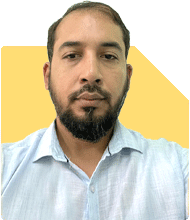Can my son with learning disability succeed in computer science?
Mayank Chandel |2628 Answers |Ask -Follow
IIT-JEE, NEET-UG, SAT, CLAT, CA, CS Exam Expert - Answered on Mar 17, 2025
Besides coaching students for entrance exams, he also guides Class 10 and 12 students about career options in engineering, medicine and the vocational sciences.
His interest in coaching students led him to launch the firm, CareerStreets.
Chandel holds an engineering degree in electronics from Nagpur University.... more

Hi Mayank, My son has specific learning disability and have pwd certificate with more than 40% benchmark, he is very good in maths and logical reasoning but very poor at language portion, he has recently given JEE, there is probability of getting in government funded college, but my concern is wheather he will be able to tackle the pressure of college, I have discussed with my son regarding the various options as he is very keen on computer science, I wanted to know what are the various options available with gim so that he can lead a successful life, he is hard working and open to many ideas, thanks in advance.
It's great that your son is hardworking and open to different ideas! Given his strong aptitude for math and logical reasoning.
Here are some options.
Government-Funded Colleges (IITs, NITs, IIITs, GFTIs): If he qualifies for these, he will get support under the PWD category, including extra time in exams, scribes (if needed), and relaxation in certain academic criteria.
Private Universities (BITS, IIIT-H, Ashoka, Shiv Nadar, Plaksha, etc.): Some private institutions offer excellent CS programs with flexible learning environments.
Specialized Accommodations: Many colleges provide support like extra tutoring, note-taking assistance, language support, and mental health counseling.
Regarding Coping with College Pressure:
Choosing the Right College: Look for institutions that offer strong disability support and a friendly learning environment.
Developing Learning Strategies: Text-to-speech tools, structured note-taking apps, and assistive learning technologies can help.
Seeking Mentors & Support Groups: Connecting with peers or seniors who faced similar challenges.
Internships & Hands-on Learning: Real-world projects can build confidence and skills outside academic pressure.
Alternative CS Education Paths
Online Degrees (IIT Madras BSc in Data Science, Georgia Tech MS Online, etc.): A flexible option if he prefers self-paced learning.
Coding Bootcamps (Scaler, Masai, Pesto, Newton School, etc.): Fast-track career-focused programs.
Open-Source Learning (CS50, MIT OCW, Udemy, Coursera, etc.): Helps in skill-building without the pressure of formal college exams.
You may like to see similar questions and answers below
Dr Shakeeb Ahmed Khan | Answer |Ask -Follow
Physiotherapist - Answered on Mar 13, 2024
Aasif Ahmed Khan | Answer |Ask -Follow
Tech Career Expert - Answered on Jul 29, 2024
Radheshyam Zanwar |6825 Answers |Ask -Follow
MHT-CET, IIT-JEE, NEET-UG Expert - Answered on Mar 02, 2026
Ravi Mittal |706 Answers |Ask -Follow
Dating, Relationships Expert - Answered on Mar 02, 2026
Ravi Mittal |706 Answers |Ask -Follow
Dating, Relationships Expert - Answered on Mar 02, 2026
Patrick Dsouza |1453 Answers |Ask -Follow
CAT, XAT, CMAT, CET Expert - Answered on Mar 02, 2026
Nayagam P P |10928 Answers |Ask -Follow
Career Counsellor - Answered on Mar 02, 2026
Nayagam P P |10928 Answers |Ask -Follow
Career Counsellor - Answered on Mar 02, 2026
Dr Deepa Suvarna |177 Answers |Ask -Follow
Paediatrician - Answered on Mar 02, 2026
Ramalingam Kalirajan |11047 Answers |Ask -Follow
Mutual Funds, Financial Planning Expert - Answered on Mar 02, 2026
Ramalingam Kalirajan |11047 Answers |Ask -Follow
Mutual Funds, Financial Planning Expert - Answered on Mar 02, 2026
T S Khurana |558 Answers |Ask -Follow
Tax Expert - Answered on Feb 28, 2026




























